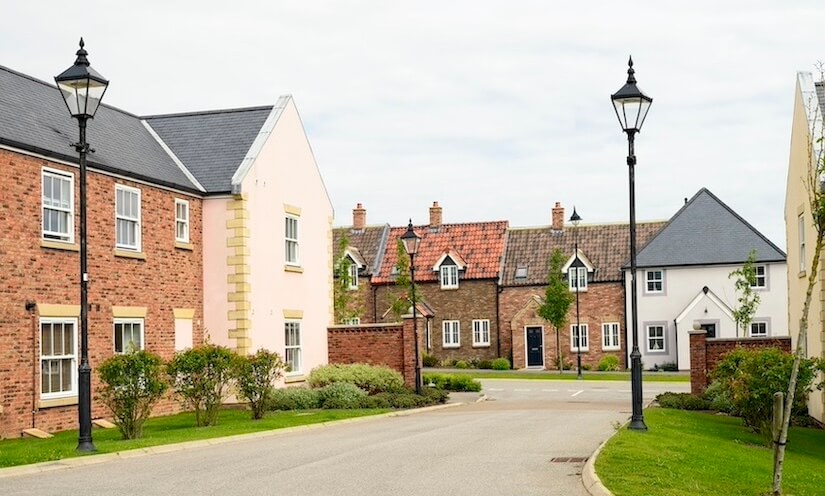Many or all of the products and brands we promote and feature including our ‘Partner Spotlights’ are from our partners who compensate us. However, this does not influence our editorial opinion found in articles, reviews and our ‘Best’ tables. Our opinion is our own. Read more on our methodology here.
Jump to
- What is happening to house prices in the UK?
- Average UK property prices
- Latest house price changes across the UK
- How property prices are changing where you live
- Are house prices falling?
- UK house price forecasts 2024 and beyond
- Expert UK housing market predictions
- Is now a good time to buy a house?
- UK House Price FAQs
What is happening to house prices in the UK?
House prices in the UK have increased for the fifth month in a row. Official Land Registry figures show average UK house prices rose to £287,924 in June. Property values were 0.5% higher compared with the previous month and 2.7% higher than a year earlier.
Land Registry data lags behind other indices but tends to be the most trusted indicator of how house prices are changing in the UK.
The latest Halifax data suggests house prices were up 2.3% year-on-year in July, the fastest annual pace since January. The lender believes the recent drop in mortgage rates could see the “modest upward trend” in house prices continue through the rest of the year.
However, the property portal Rightmove recently reported that asking prices set by home sellers in the UK were 1.5% lower in August compared with the previous month.
| Nationwide | Halifax | Rightmove | Land Registry | |
|---|---|---|---|---|
| Average house price | £266,334 | £291,268 | £367,785 | £287,924 |
| Monthly change | +0.3% | +0.8% | -1.5% | +0.5% |
| Annual change | +2.1% | +2.3% | +0.8% | +2.7% |
| Figures for | July 2024 | July 2024 | August 2024 | June 2024 |
| Methodology | Based on Nationwide mortgage transactions | Based on Lloyds Banking Group mortgage transactions | Based on asking prices of newly marketed properties | Based on official completed house sales data |
Average UK property prices
The average house price is £305,370 in England, £215,518 in Wales, and £192,488 in Scotland, according to Land Registry data for June 2024. In the second quarter of 2024, the average property price in Northern Ireland was £185,025.
On a regional basis, the highest average house prices in England in June 2024 were in London (£523,134) and the South East (£382,522). The lowest average house prices were in the North East (£164,886).
Latest house price changes across the UK
The direction and pace of house price changes differ across the UK. Average house prices in England in June 2024 increased by 0.6% compared with the previous month, while in Wales prices increased by 0.3%. In Scotland, prices remained unchanged month-on-month, according to the latest Land Registry data.
On an annual basis, average house prices are 2.4% higher in England and 1.8% higher in Wales compared with a year earlier. Property prices in Scotland are 4.3% higher year-on-year. In Northern Ireland, monthly prices were 3.6% higher and annual prices were 6.4% higher in Q2 (April-June) 2024.
| UK | England | Scotland | Wales | Northern Ireland | |
|---|---|---|---|---|---|
| Average house price | £287,924 | £305,370 | £192,488 | £215,518 | £185,025 |
| One year earlier | £280,278 | £298,112 | £184,624 | £211,652 | £173,917 |
| Annual change | +2.7% | +2.4% | +4.3% | +1.8% | +6.4% |
| Monthly change | +0.5% | +0.6% | +0.0% | +0.3% | +3.6% |
Source: HM Land Registry. Figures for England, Scotland and Wales are for June 2024. Figures for Northern Ireland are for Q2 2024.
How property prices are changing where you live
Average house prices are higher in all regions of England compared to a year ago. The largest annual increase has been seen in Yorkshire and the Humber, where property values are 4.7% higher than 12 months earlier. The next biggest annual rise is in the North East (+4.2%).
London saw the slowest annual growth in property prices in June of 0.6%, but values were 1.2% higher on a monthly basis. The largest month-on-month rise was in Yorkshire and the Humber (+2.7%). However, house prices fell 1.0% compared with the previous month in the South West, and by 0.5% in the East Midlands.
Are house prices falling?
The latest house price data suggests prices have started to rise month-on-month. This follows a period where values were often showing small rises and falls. Halifax figures showed typical property prices were 0.8% higher in July, while Nationwide reported values had increased by 0.3%.
Property prices, and the direction and pace of price movements, change all the time. However, there are signs that the underlying trend of steadily rising property prices that has generally been the norm in recent years may have resumed.
UK house price forecasts 2024 and beyond
Predictions as to what will happen to UK house prices in 2024 are mixed. Some forecasts suggest property prices will rise in 2024, while others predict they will fall.
| 2024 | 2025 | 2026 | |
|---|---|---|---|
| Capital Economics | +1.0% | +5.0% | +4.0% |
| Knight Frank | +3.0% | +3.0% | +4.0% |
| Office for Budget Responsibility | -2.3% | -0.4% | +2.2% |
| Savills | +2.5% | +3.5% | +4.5% |
Expert UK housing market predictions
Richard Donnell, Executive Director, Zoopla
“For the rest of the year, we expect continued modest growth in house prices. This will be greater outside the south of England where affordability is less of a constraint on price inflation. The timing of the first base rate cut is important. It will deliver a boost to consumer confidence and market activity rather than leading to any major reduction in mortgage rates for new home buyers. Nothing in the King’s Speech or the new Government’s plans has any material impact on the outlook for the market in the next 12-18 months. Economic growth and increasing home building will benefit homebuyers and renters in the long run. However, affordability as well as access to home ownership and rented housing remain challenges for a significant proportion of households on lower incomes.”
Amanda Bryden, Head of Mortgages, Halifax
“Last week’s Bank of England’s Base Rate cut, which follows recent reductions in mortgage rates, is encouraging for those looking to remortgage, purchase a first home or move along the housing ladder. However, affordability constraints and the lack of available properties continue to pose challenges for prospective homeowners. Against the backdrop of lower mortgage rates and potential further Base Rate reductions, we anticipate house prices to continue a modest upward trend throughout the remainder of this year.”
Simon Rubinsohn, Chief Economist at the Royal Institution of Chartered Surveyors (RICS)
“The new government’s focus on boosting housing development alongside the recent quarter point base rate cut does appear to have shifted the mood music in the sales market, with projections for both near and medium activity picking up. Inevitably, significant challenges lie ahead in delivering on the ambitions around planning reform and it is far from clear that the Bank of England will follow the August move with further easing over the coming months, but, even so, the policy mix is becoming more supportive for the sector.”
Tim Bannister, Director of Property Science at Rightmove
“The first Bank Rate cut since 2020 has sparked a welcome late summer boost in buyer activity. While mortgage rates aren’t yet substantially lower since the rate cut, the fact that the long-hoped-for first cut has finally arrived, and mortgage rates are heading downwards, is positive for home-mover sentiment. As the summer holiday season comes to an end, the conditions are there for a more active autumn market. The reaction from home-movers to what is hopefully only the first of several rate cuts over the next year or two, combined with other positive data and trends, has led us to raise our price prediction for the year. We now expect new seller prices to rise marginally by 1% over the whole of 2024. This is a relatively small revision from our original prediction of a 1% fall in prices over the year, since we didn’t initially forecast anything more drastic than a slight drop in prices this year.”
» MORE: Where is the cheapest place to rent in the UK?
Compare Mortgage Deals
Use our mortgage comparison tool to compare mortgage deals from across the market
Is now a good time to buy a house?
Financially, the best time to buy a house is when mortgage rates and house prices are both low. In reality, the chances of this happening, and being able to time a purchase right, are slim. So instead, it’s important to find a property and mortgage you can afford without overstretching.
While mortgage rates have dropped since the middle of last year, they remain significantly higher than through most of the 2010s and early 2020s. Simply put, mortgages aren’t as affordable as a few years ago.
If your funds are tight, waiting for rates to come down may be your only option. Encouragingly, following the cut in the base rate of interest to 5% in August, and with competition among lenders recently intensifying, many experts believe there may be more mortgage rate cuts to come. Earlier in the year, there were suggestions that house prices could fall this year, which would help improve affordability further. However, in recent months, some of these forecasts have been revised and now predict property prices will rise.
Ultimately, it’s impossible to predict with any certainty what will happen to house prices and the cost of mortgages.
Because of this, whether now is a good time to buy a property or not largely depends on your circumstances, priorities and outlook. Getting mortgage advice can help you figure out the numbers. But the ultimate decision to buy now or wait will rest with you.
» MORE: Check current mortgage rates
UK House Price FAQs
The average house price in the UK was £287,924 in June 2024, up from £280,278 a year earlier, according to the latest HM Land Registry UK House Price Index. This means UK property prices are 2.7% higher than a year before, and 0.5% higher month-on-month.
Many house price forecasts now predict property prices will rise in 2024, though some predict they could fall. Sentiment has also recently changed among some commentators. For example, Savills started the year by predicting house prices would fall 3% during 2024, but now thinks property values will end the year 2.5% higher.
Enquiries from potential homebuyers picked up slightly in July, according to the latest survey by RICS. At the same time, surveyors noted a small rise in the number of new properties being put up for sale. However, broadly both measures of activity were relatively flat. Higher mortgage rates, increases in the cost of living, and weakened market confidence have all combined to dampen the housing market in the past year. However, in recent months, there have been some signs that the market outlook may be improving.
It is taking home sellers on average 59 days to find a buyer, according to the latest Rightmove data. A year ago, it was taking a shorter time of 55 days to secure a buyer.
The average discount secured by home buyers on asking prices was £16,600 – or 3.2% – in June, according to Zoopla. This compares with the typical discount of £23,000, or 4.4%, that buyers were securing in October last year. The property website said discounts were bigger last year because higher mortgage rates meant there were fewer buyers around.
London house prices were 0.6% higher in June 2024 compared with a year earlier, according to the latest Land Registry data. On a monthly basis, house prices in London rose by 1.2% in June from May. The average house price in London is £523,134.
There are several house price reports and indices published each month that provide insight into house price trends and the housing market in the UK. Four of the most respected indices are published by HM Land Registry, Rightmove, Halifax and Nationwide, each showing how property prices are changing from month to month and on an annual basis. However, as each index tends to be based on different data and may be calculated in different ways, they often show different average house prices and changes when compared with one another.
Land Registry sold house price data is usually considered one of the most accurate housing market barometers because it is based on completed property sales, and includes cash purchases, as well as properties bought using a mortgage. However, because it is collated in this way, the data tends to be around two months behind other indices.
Dive even deeper

Where is the Cheapest Place to Rent in the UK?
Knowing the cheapest places in the UK to rent can be a good starting point if you’re looking for somewhere affordable to live. Here’s where rents are lowest right now.



